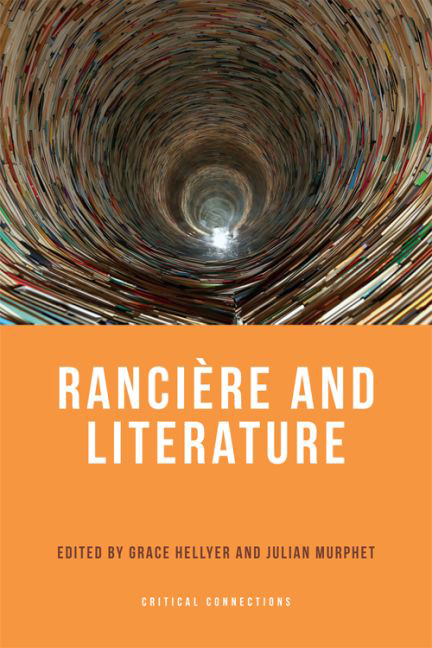Book contents
- Frontmatter
- Contents
- Acknowledgements
- Notes on Contributors
- Introduction: Rancière and Literature
- SECTION I Coordinates
- SECTION II Realisms
- 6 The Novelist and Her Poor: Nineteenth-Century Character Dynamics
- 7 ‘Broiled in Hell-fire’: Melville, Rancière and the Heresy of Literarity
- 8 Why Maggie Tulliver Had To Be Killed
- 9 The Meaning in the Detail: Literature and the Detritus of the Nineteenth Century in Jacques Rancière and Walter Benjamin
- SECTION III Contemporaneities
- Index
8 - Why Maggie Tulliver Had To Be Killed
from SECTION II - Realisms
Published online by Cambridge University Press: 15 September 2017
- Frontmatter
- Contents
- Acknowledgements
- Notes on Contributors
- Introduction: Rancière and Literature
- SECTION I Coordinates
- SECTION II Realisms
- 6 The Novelist and Her Poor: Nineteenth-Century Character Dynamics
- 7 ‘Broiled in Hell-fire’: Melville, Rancière and the Heresy of Literarity
- 8 Why Maggie Tulliver Had To Be Killed
- 9 The Meaning in the Detail: Literature and the Detritus of the Nineteenth Century in Jacques Rancière and Walter Benjamin
- SECTION III Contemporaneities
- Index
Summary
‘To kill people or to marry them is to beg the question,’ writes William Dean Howells in a study of literary heroines, ‘but into some corner the novelist is commonly driven who deals with a problem. […] How life would have solved the problem of Maggie Tulliver I am not quite prepared to say; but I have my revolt against George Eliot's solution.’ Howells's protest against the ending of The Mill on the Floss is understandable, and pretty widely shared. The flash flood that drowns the protagonist seems to impose on the plot a certain logic of cruel necessity, leaving readers to lament Eliot's judgement that such a character as Maggie cannot be allowed to survive. John Ruskin's complaint was different: ‘There is not a single person in the book of the smallest importance to anybody in the world but themselves,’ he fumed, ‘or whose qualities deserved so much as a line of printer's type in their description.’ Where Howells takes issue with the extraordinary circumstances of Maggie's death, Ruskin objects to the gross ordinariness of her life, unconvinced she should exist in the first place. On the face of it, these critiques seem opposed: Howells valorises Maggie as a unique individual who deserves a better fate, while Ruskin writes her off as part of a demographic set of worthless figures (somewhat ironically, since his criticism of Bleak House in the same essay is that Dickens registers the deaths of his characters with the statistical indifference of an actuary). Yet the two in fact share a premise: that something called ‘life’ is tasked with solving narrative problems, and that a novel can be assessed by the power it exerts to make characters live or die in narrative time.
With that premise in mind, this chapter asks a simple question: why does Eliot's novel kill its protagonist? I borrow this question from an essay by Jacques Rancière, which famously asks the same of Madame Bovary.
- Type
- Chapter
- Information
- Rancière and Literature , pp. 164 - 182Publisher: Edinburgh University PressPrint publication year: 2016



